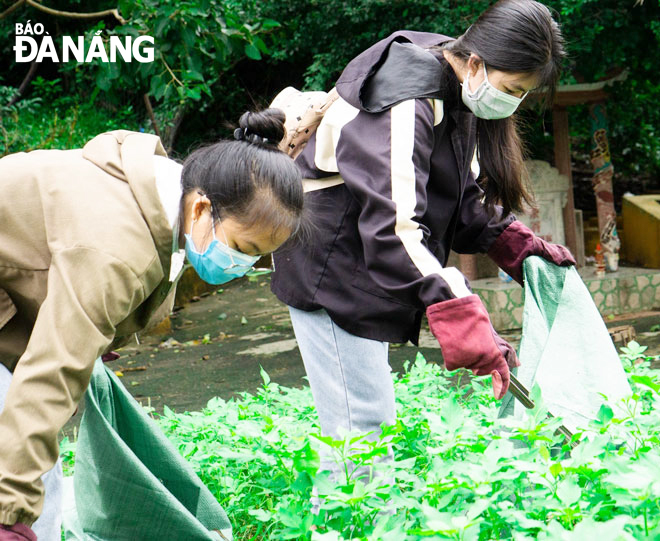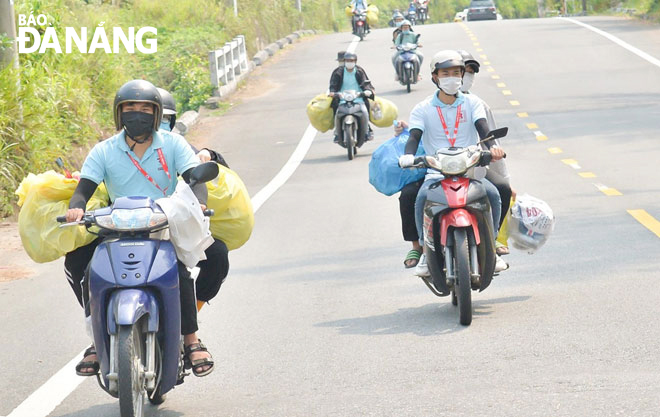Da Nang takes action to reduce plastic waste
In an effort to realize its goals of turning itself into a zero plastic waste city, Da Nang has been implementing many programmes and projects on solid waste management, classification of solid waste at the source, and plastic waste reduction and recycling.
According to Deputy Director of the municipal Department of Natural Resources and the Environment Vo Nguyen Chuong, in 2021, his unit coordinated with many departments, agencies and district-level authorities to carry out 9 cooperation projects on boosting solid and plastic waste management and solid waste classification at source with international organizations, and foreign non-governmental organizations. Also, the department appealed for more than VND70 billion worth of aid for intensive technical support in waste management in the city.
 |
| Every year, Da Nang generates about 80,000 tons of plastic waste, mainly plastic bags and bottles, foam boxes and single-use plastics. IN THE PHOTO: Young people in Da Nang have been actively involved in local environmental protection activities. Photo: T.Y |
Completing document on plastic waste management
According to the municipal Department of Natural Resources and the Environment, each year the city generates about 80,000 tons of plastic waste, mainly plastic bags and bottles, foam boxes, and single-use plastics. 90% of which is collected and transferred to Khanh Son Landfill for classification and burying, whilst the remainder scattered in the natural environment and sewers or on vacant land.
Over the past year, the classification of waste at source has made a positive change, attracting 83% of residential groups citywide to join. A number of projects have been developed in the city, including ‘Plastic waste collection bin’, ‘Women limit the use of plastic bags’, ‘Waste classification- environmental trash bins’, and ‘Use plastic baskets to buy food instead of plastic bags’.
With the current economic growth momentum, by 2030, the total amount of plastic waste generated every day in the city will be around 228 tons, accounting for about 12.7-18.3% of domestic solid waste. The rate of classification and collection of plastic waste at source will reach 90-95%, mainly of them are large-sized plastic with high economic values. Meanwhile, while small-sized plastic with low economic value, such as plastic bags, have not been sorted and collected effectively. Currently, the volume of plastic waste which is not controlled is about over 6 tons/day, mainly plastic bags, plastic bottles, single-use plastic cups and multi-component plastics.
Da Nang issued a plan No 122/KH-UBND dated June 24 2021 on ocean plastic waste management in the city by 2025, with a vision towards 2030.
Under the plan, during the 2021-2025 period, 100% of State management agencies will not use water bottles and plastic straws in meetings, conferences, seminars and events. 90% of households, businesses, schools, offices and other units will be active involved in classifying domestic solid waste, including plastic waste, at source.
At least 80% of the total fishermen do not dispose of fishing gears and plastic garbage into the sea. Over 90% of households living along both banks of local rivers do not dump plastic waste directly into the river, and 70% of food service providers at accommodation establishments do not use single-use plastic products.
For the 2026-2030 period, the city will strive to encourage more than 95% of the total fishermen citywide to commit not to dispose of fishing gears and plastic garbage into the sea, and at least 80% of food service providers not use single-use plastic products. Also, over 90% of households, schools, businesses, offices and other units will classify trash at source.
Boosting international cooperation
The Da Nang Department of Natural Resources and Environment has recently introduced the “Clean cities, blue ocean” (CCBO) programme in the city.
 |
| A group of volunteers transporting plastic waste collected on the Son Tra Peninsula to the trash collection areas. Photo: T.Y |
The CCBO is the United States Agency for International Development (USAID)'s flagship programme for combating ocean plastic pollution during the 2019 – 2024 period.
This programme works globally to target ocean plastics directly at their source, focusing on rapidly urbanizing areas that contribute significantly to the estimated eight million metric tons of plastic that flow into the ocean each year.Da Nang is one of the four localities across the country to carry out the programme. In Da Nang, the programme aims to support authorities in implementing the plan on ocean plastic waste management and initiatives to promote the fight against plastic waste pollution in terms of equipment and consulting.
In particular, the programme will support the implementation of ‘Strengthening public-private cooperation in recycling, waste recovery and circular economy in Da Nang’, which will be implemented from December 2021 to July 2023 with total capital of US$161,000.
This soon-to-be-developed project will highlight some key activities such as improving the collection of recyclable waste and the capacity of garbage collecting units, and the recycling market through digital commerce.
2021 is the year Da Nang strengthened international cooperation, and promoted scientific research and technology transfer on ocean plastic waste treatment.
Specifically, the city carried out the World Wide Fund for Nature-funded ‘Plastic Pollution Reduction Urban Area’ project in Thanh Khe District with the aim of tackling plastic pollution in the district in an effort to reduce plastic waste production by 30% in 2020, and achieve zero plastic waste by 2030.
Also, the city proposed the implementation of the project on building an ocean plastic waste monitoring system based on remote sensing technology, image interpretation and geographic information system combined with artificial intelligence and indigenous knowledge. The project is funded by the United Nations Economic and Social Commission for Asia and the Pacific (UNESCAP).
According to Mr. Vo Nguyen Chuong, international cooperation programmes will support Da Nang to complete the plastic waste treatment process and carry out its own solutions.
Reporting by TIEU YEN - Translating by M.DUNG